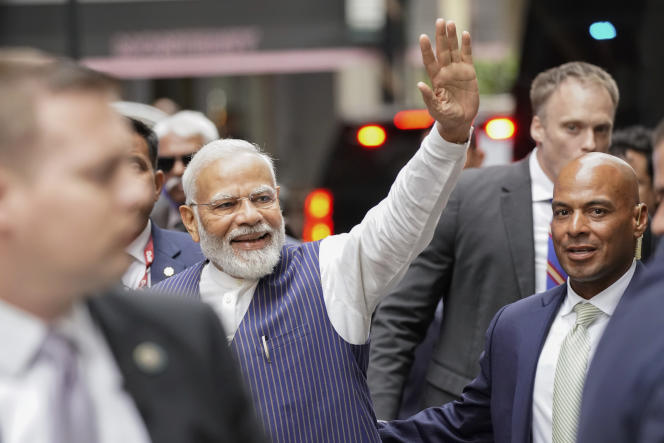The time for American lessons in foreign policy seems to be over. By receiving Indian Prime Minister Narendra Modi on June 21 and 22, American President Joe Biden intended to consolidate an essential partnership for his country by refraining from frontally criticizing his guest about the internal excesses of the Hindu nationalist. State visit, solemn dinner at the White House, numerous announcements in the industrial, climate and defense sectors: it is time to identify common interests. A priority horizon dominates in Washington: the systemic rivalry with China.
“India will be a key strategic partner for the United States over the coming decades.National Security Council spokesman John Kirby said. India’s growing commitment to play a greater international role, especially within the Quad in the Indo-Pacific, illustrates a new and growing desire to join the United States in protecting and promoting a vision community of a free and open international order based on law. »
If this Indian involvement in world affairs is real, it is not a question, for New Delhi, of “join” in the USA. Narendra Modi has developed a multi-vector foreign policy: no restrictive alignment, but a clever balance of cross-relationships, at the assumed risk of contradiction. Faced with Chinese ambitions, India shares many concerns expressed in Washington. But she prefers to follow her own score. The Indian Prime Minister has been rubbing shoulders with Chinese President Xi Jinping since 2016 within the Shanghai Cooperation Organization (SCO), designed to counterbalance Western influence. But, on the other hand, New Delhi is engaged in the Quadrilateral Security Dialogue (Quad), seen by Beijing as a hostile partnership, with the United States, Australia and Japan.
Application for technology transfers
Based in New Delhi, journalist Barkha Dutt wrote a column in the washington poston June 20, in which she issued a warning: “Don’t be naive, American friends. India will never be your ally. » According to her, it would be futile to expect from this country a form of “monogamy” diplomatic. “India reserves the right to flirt with Russia, Iran – and even China – if its national interests dictate the need. »
The obvious example of this form of strategic autonomy – which is reminiscent of that of President Erdogan’s Turkey – is the war in Ukraine. For sixteen months, India has not voted for any United Nations resolution condemning Russian aggression. Narendra Modi merely calls for a halt to the fighting, signaling to Putin that “the era is not war”. New Delhi did not register within the framework of the sanctions put in place by Europe and the United States. On the contrary, India has multiplied by twenty-two its purchases of low-cost crude. In May, it imported nearly 2 million barrels of oil per day from Russia. It refines, keeps some for its own consumption and resells the surplus kerosene to Westerners.
You have 50.75% of this article left to read. The following is for subscribers only.
